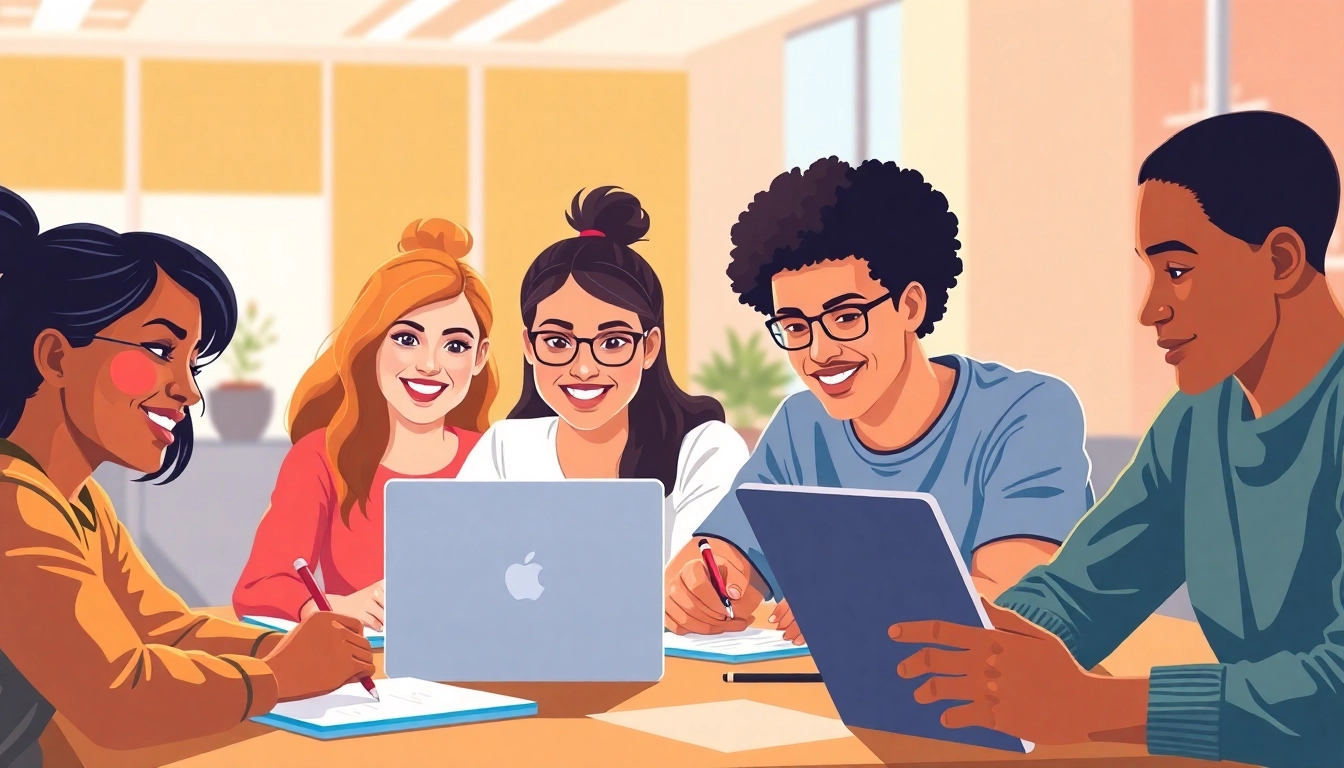Understanding Unique Career Insight Tests
What Are Career Insight Tests?
Career insight tests are structured assessments designed to help individuals identify their strengths, interests, skills, and personality traits in relation to potential career paths. These tests can be a valuable tool for career development, especially in today’s rapidly changing job market. Unlike traditional aptitude tests, which focus solely on quantifiable skills, unique career insight tests incorporate a broader view of a person’s capabilities, including emotional and social dimensions. This multifaceted approach allows individuals to gain deeper insights into what makes them tick and where they might thrive.
By employing innovative methodologies and data-driven algorithms, these assessments guide individuals through a journey of self-discovery, all while utilizing narratives that resonate on a personal level. This not only makes the process engaging but also more relatable. For those seeking to explore unique career insight tests with storytelling, the integration of personal stories helps contextualize the data received from these tests, making it more applicable to real-life scenarios.
The Role of Storytelling in Assessment
Storytelling plays a critical role in modern career assessments by humanizing the data and creating a narrative that individuals can connect with. By weaving personal stories into the fabric of assessments, participants can reflect their experiences, challenges, and aspirations through anecdotes. This narrative style not only makes the assessments more relatable but also enhances engagement.
Furthermore, storytelling encourages individuals to open up about their past experiences, fears, and ambitions. For instance, a participant may recount an inspiring story about overcoming obstacles, which can lead to insights about resilience and determination—qualities that may not be fully captured through traditional testing methods. Incorporating storytelling can also strike a chord with emotions, making the entire testing process more memorable, thus aiding in retention of the insights gained.
Benefits of Personalized Career Tests
Personalized career tests offer numerous benefits, including increased accuracy in matching individuals with suitable careers. These tests provide tailored results based on a person’s unique profile rather than a one-size-fits-all answer. Individuals are more likely to pursue career paths that align with their interests and strengths when they receive personalized feedback.
Additionally, personalized tests foster a deeper understanding of one’s self. By exploring qualities such as creativity, leadership potential, and personal values, individuals can make informed decisions about their career trajectory. This tailored approach not only aids in immediate job placement but also supports long-term career satisfaction and success.
Finally, when these personalized insights are tied to narrative techniques, they become more impactful. Storytelling provides context to the numerical results, helping individuals connect the dots between their assessment data and real-world applications. This combination of personalization and narrative can empower individuals to navigate their career paths with confidence.
How Unique Tests Enhance Career Planning
Integrating Personal Narratives into Assessments
Innovative assessments leverage personal narratives, allowing individuals to share their professional journeys. By integrating these narratives, assessments reflect a person’s lived experiences, cultural background, and professional challenges. This integration leads to a more comprehensive understanding of the individual’s fit for various career paths.
For example, a narrative-based assessment may prompt participants to reflect on their most significant work-related experiences, asking them to describe how they handled setbacks or what inspires them. Such prompts encourage individuals to articulate their thoughts and reflect on their behaviors and motivations. This narrative fusion enriches the assessment experience and yields results that resonate profoundly with participants.
Data-Driven Insights for Career Choices
Unique career insight tests often utilize data analytics to identify patterns and correlations between various personality traits and career success. By analyzing the data gleaned from numerous assessments, organizations can pinpoint which characteristics are associated with high performance in specific roles. This data-driven approach allows individuals to make choices based on evidence rather than guesswork.
For example, an analysis might reveal that individuals with strong interpersonal skills and emotional intelligence excel in client-facing roles. This sort of insight empowers testers to explore career options they might not have considered previously, guiding them toward roles that align more closely with their natural abilities and learned experiences.
Success Stories: Transformative Experiences
Many individuals have experienced transformative career changes as a result of unique career insight tests. Success stories abound of people who have recalibrated their professional journeys based on insights gained from these assessments. These stories showcase the powerful impact that personalized tests can have on career satisfaction and professional fulfillment.
For instance, one individual who was stuck in a monotonous job took a narrative-based assessment and discovered their passion for innovative design. The test results prompted them to pursue further education in design thinking, ultimately leading to a rewarding career in a creative sector. Such accounts are increasingly common as individuals recognize the potential for these assessments to alter the course of their careers for the better.
Implementing Storytelling in Career Assessments
Developing Engaging Assessment Frameworks
Creating engaging assessment frameworks requires a blend of narrative techniques and effective assessment methodologies. Developers should focus on crafting questions that prompt participants to share their stories in rich detail. Questions that explore personal achievements, challenges faced, and motivation behind career choices can elicit responses that provide valuable insights.
Incorporating varied formats—such as video submissions, written reflections, or even verbal storytelling—can also engage participants more effectively, leading to a richer data collection experience. Additionally, a supportive, non-judgmental environment cultivates openness, allowing individuals to communicate authentically. Through thoughtful design, frameworks can not only assess but also inspire growth and self-discovery among participants.
Case Studies of Effective Storytelling in Testing
Numerous organizations have embraced storytelling within their career assessments to great effect. For example, successful startups often utilize narrative techniques to better understand potential hires’ creative problem-solving abilities. Rather than merely assessing technical skills, they focus on how potential employees approach challenges and adapt to dynamic environments.
A notable case is one tech firm that implemented a narrative-based assessment during its recruitment process. By asking candidates to discuss previous projects in-depth, they were able to glean deeper insights into applicants’ capabilities and cultural fits than traditional tests. This approach not only optimized their hiring process but also built a stronger team chemistry and overall company culture.
Measuring the Impact of Narrative-Based Insights
To ascertain the effectiveness of integrating storytelling in career assessments, organizations must define clear metrics. These can include overall satisfaction rates from participants, successful hires, retention rates, and performance reviews. By collecting this data, organizations can evaluate how traditional versus narrative-based assessments impact hiring decisions and employee performance.
Moreover, post-assessment surveys can provide qualitative data to capture participants’ perceptions of their experience. Feedback around the relevance of questions, the engagement of the process, and overall satisfaction can provide critical input for future enhancements. Continuous improvement based on this empirical data strengthens the organization’s approach to assessments and leads to better outcomes.
Challenges in Using Storytelling for Career Development
Common Pitfalls in Insight Tests
While unique career insight tests represent a progressive approach to career development, they are not without challenges. Common pitfalls can include leading questions that bias responses or overly complex narratives that confuse participants instead of facilitating self-discovery. Additionally, if not designed thoughtfully, assessments may lack reliability and validity.
A key challenge is ensuring that the storytelling component remains focused on obtaining insightful data rather than meandering into unrelated personal anecdotes. Striking the right balance between narrative and structure is essential to arriving at meaningful conclusions while still allowing room for personal expression.
Overcoming Resistance to Narrative Techniques
Implementing narrative techniques may encounter resistance from both organizations and individuals accustomed to traditional methods. Organizations may worry about the validity of narratives compared to quantitative data, while individuals might be hesitant to share personal stories out of fear of repercussions or breaches of privacy.
To overcome this resistance, it’s vital to communicate the benefits of narrative-based assessments clearly. Training and development initiatives can educate facilitators and participants alike on how to engage effectively. Moreover, establishing a safe environment where stories can be shared without judgment encourages openness and can enrich the data collection process.
Maintaining Objectivity and Accuracy
Ensuring objectivity in assessments that rely heavily on personal narratives presents a unique challenge. There is a risk that subjective biases can skew results. To counteract this, organizations must employ structured rubrics for evaluation and train assessors to recognize their biases. Using multiple evaluators can also serve as a check against subjectivity, ensuring assessments remain reliable.
Moreover, integrating quantitative measures alongside narrative assessments can lend balance to the process. This combination allows organizations to capture both the emotional and technical qualities of candidates, leading to a more holistic view of fit and potential.
Future Trends in Career Insight Testing
The Rise of Digital Storytelling Tools
As technology continues to evolve, the future of career insight testing is set to intersect increasingly with digital storytelling tools. Platforms that allow for multimedia narratives—such as video and interactive content—can provide richer insights into candidates’ personalities and skills. These tools can illustrate how individuals communicate and connect on different levels, invigorating the assessment process.
Moreover, the integration of Artificial Intelligence can enhance personalization, offering tailored questions and reflective prompts based on users’ responses. Such technological advances promise to revolutionize how organizations approach hiring and development.
Personalization in Career Assessments
The future of career assessments will inevitably trend toward deeper personalization. Advances in data analytics may allow organizations to create dynamic assessments tailored not only to individuals but also to changing job market demands. This ability to adapt assessments to reflect real-time labor market insights ensures that candidates receive the most relevant insight as they navigate their career journeys.
Furthermore, personalization will extend to the user experience, making assessments intuitive, engaging, and easy to navigate. By fostering an environment that encourages honest reflection and vibrant storytelling, future assessments can better serve the evolving landscape of career development.
How Technology is Shaping Insight Tests
Technology plays a pivotal role in shaping the landscape of career insight testing. With the rise of data analytics, organizations can better interpret the vast amounts of data captured during assessments. This capability allows for the identification of trends and patterns that were previously undetectable.
Moreover, technology facilitates remote assessments, ensuring wider accessibility for candidates around the world. Virtual environments—integrating gamification and immersive experiences—can enhance engagement during assessments. Such advancements position career insight tests as indispensable tools for modern career planning and development.



